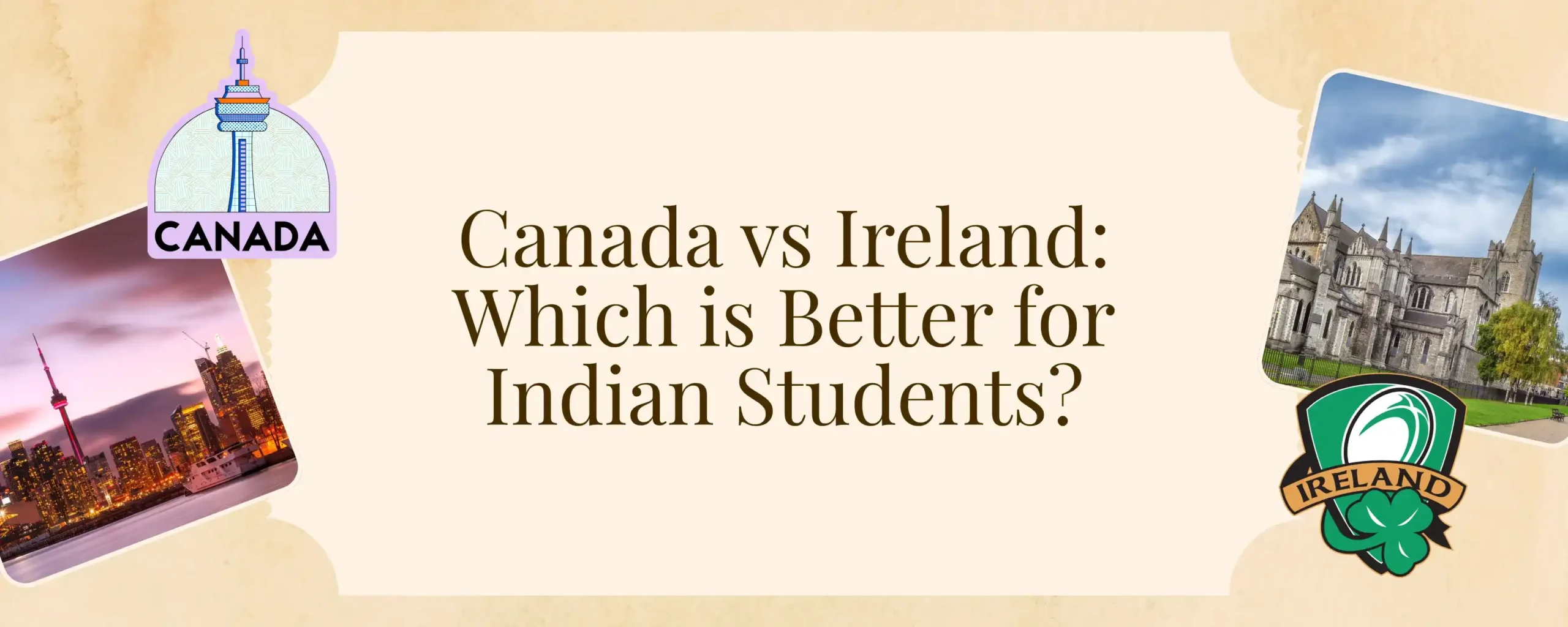Studying abroad is not just a trend but a top priority for many Indian students. Among the many choices, Canada and Ireland stand out as two of the most popular destinations. “Should I study in Canada or Ireland?” That’s surely an important decision to make! Both offer a high quality of life, excellent universities, and vibrant student life. While Canada is known for its multicultural environment and strong job market, Ireland stands out for its close-knit culture and Europe’s growing tech hub status. Selecting one out of the two for your study abroad dream is a relatively tough call. So, to help you out, in this blog we are going to compare Canada and Ireland in terms of climate, education system, costs, jobs, PR, and more.
Climate, Culture, and Safety: Canada vs Ireland
One of the first things Indian students think about is the climate. Canada is known for its extreme winters, with temperatures often dipping to -20°C or below in some regions like Ontario, Alberta, and Manitoba. Summers, however, are warm and pleasant. For Indian students, adapting may take time, but Canadian cities are well-prepared with heating systems and winter-friendly infrastructure. Ireland, on the other hand, has a milder oceanic climate, with temperatures rarely dropping below 0°C, though frequent rain is part of daily life. Many Indian students find Ireland’s weather easier to adjust to compared to Canada’s harsh winters.
Culturally, Canada is famous for its multiculturalism, welcoming international students from all over the world, while Ireland offers a more traditional European charm with a warm, close-knit community vibe. Both countries rank high in global safety indexes. Ireland is ranked as the 2nd safest country in the world, while Canada is 11th. Both have low crime rates and are known for their student-friendly environments.
Education System: Canada vs Ireland
The primary reason why you are choosing a country is education. So naturally you would want to have the best of it. The Canadian education system is structured similarly to that of the United States. Universities are known for their research-intensive programs. Co-op and internship programs are a huge part of the learning experience, giving students practical, hands-on experience in their field of study. While in Ireland, the education system is closely tied to the country’s booming industries. Teaching styles often focus on industry-linked projects and case studies, preparing students for the workforce from day one. Both countries have highly ranked universities and modern education systems. The below table makes the comparison easier.
| Feature | Canada | Ireland |
| Teaching Style | Practical, research-driven, flexible programs | Academic + research focus with industry tie-ups |
| Semester Timelines | Fall (Sept) & Winter (Jan) are main intakes; some Summer programs too | Autumn (Sept) & Spring (Jan/Feb) intakes |
| Credit System | Credit-based (students accumulate credits for degree completion) | European Credit Transfer System (ECTS) – widely accepted across Europe |
| Grading Methods | GPA scale (commonly 0–4.0) | Percentage bands with classifications (First Class, Second Class, etc.) |
| Teaching Style | Research-driven with strong academic focus | Industry-linked, practical, and career-oriented |
| Internships/Co-ops | Widely integrated (especially in Engineering, Business, CS programs) | Strong industry collaborations, especially in tech, pharma & business |
Top Courses to Pursue
Both countries offer a wide range of in-demand courses. In Canada, STEM fields are particularly popular, with a strong focus on AI, data science, engineering, and computer science. Ireland has earned a reputation as a major tech and finance hub. It’s an ideal destination for students interested in IT, data analytics, pharmaceuticals, and business. Given below is a handpicked list of subjects with top courses to study in Canada and Ireland. Select the one that best suits you.
| Top Courses in Canada | Top Courses in Ireland |
| Computer Science Business Management Engineering Hospitality Tourism Management Economics Accounting Finance Marketing | Business Analytics Data Science Computer Science Pharmaceutical Sciences Medicine Engineering Management Law Construction |
Student-Friendly Cities and Cost of Study
Canada offers a variety of student cities, each with a unique vibe. Toronto and Vancouver are bustling, multicultural hubs, but also have a high cost of living. Cities like Montreal, Calgary, and Halifax offer a more affordable lifestyle without sacrificing a high quality of education and diverse communities. As per the QS Best Student Cities 2025, Montreal, Toronto, Vancouver, Ottawa and Quebec rank among the top 100 student friendly cities in the world from Canada. Public transport is efficient in major cities, but housing can be competitive.
Ireland’s top student cities include Dublin, Cork, and Galway. Dublin is a vibrant capital with a high cost of living, especially for housing. However, smaller cities like Cork and Galway are much more budget-friendly. Both countries allow students to work part-time to help cover living costs. For most Indian students, affordability is a major factor. So, let’s look at the average monthly living expense for a student:
| Expense | Canada | Ireland |
| Tuition Fees (UG/PG) | CAD 15,000 – 35,000 per year (₹9–21 Lakhs) | €10,000 – 25,000 per year (₹9–22 Lakhs) |
| Living Expenses | CAD 10,000 – 15,000 (₹6–9 Lakhs/year) | €7,000 – 12,000 (₹6–10 Lakhs/year) |
| Health Insurance | CAD 600 – 900/year | €500 – 700/year |
Top Universities to Pursue Masters
Canada and Ireland are home to globally recognized universities. Here are a few top-ranked institutions:
| University | QS World Rank 2025 | Highlights or Specializations |
| Canada | ||
| University of Toronto | 25 | A top-ranked global institution known for its research and diverse programs, especially in medicine and engineering. |
| McGill University | 29 | Known for its academic excellence, especially in arts and science, and its strong international reputation. |
| University of British Columbia | 38 | Famous for its beautiful campus and strong programs in engineering, business, and computer science. |
| University of Waterloo | 115 | A leader in technology and engineering, known for its extensive co-op programs. |
| Ireland | ||
| Trinity College Dublin | 87 | Ireland’s oldest and most prestigious university, known for its history and strong programs in arts, business, and law. |
| University College Dublin (UCD) | 126 | The largest university in Ireland, known for being research-intensive with excellent programs in business and medicine. |
| University College Cork (UCC) | 273 | A world-class university with a strong tradition of research and academic excellence, particularly in law, business, and medicine. |
| Dublin City University (DCU) | 421 | A dynamic university known for its industry-linked programs in engineering, computing, and business. |
Cost of Studying Undergraduate & Postgraduate Programs
The cost of education is a major factor for most students. Calculating your cost of education helps to decide your financial source to sponsor your study abroad. Here’s a general overview of the cost of study in Ireland and Canada in 2025:
Canada:
- Undergraduate: CAD 25,000 to CAD 50,000 per year.
- Postgraduate: CAD 18,000 to CAD 45,000 per year.
- Costs for professional programs like medicine and dentistry are significantly higher. Tuition at public universities is generally more affordable than at private ones.
Ireland:
- Undergraduate: EUR 10,000 to EUR 25,000 per year.
- Postgraduate: EUR 10,000 to EUR 30,000 per year.
- Public universities generally have lower fees than private institutions, though both are more affordable than top-tier US universities.
Additional costs like student fees and materials can add another CAD 1,000 to 2,000 per year in Canada and EUR 500 to 1,000 in Ireland.
Acceptance Rate for Indian Students
For Indian students considering studying abroad, Canada and Ireland both have different trends in visa approvals and student interest. In Canada, the student visa approval rate for Indian applicants saw an impressive jump from 72% in 2023 to 85% in 2024, despite a simultaneous drop in the total number of applications. This decrease in interest is due to ongoing diplomatic tensions between India and Canada and staff cuts at Canadian consulates in India, which have led to longer visa processing times. Though Canada has streamlined its visa process for certain students, the requirements for proof of funds are strict.
In contrast, Ireland is emerging as a top alternative. Ireland has a high acceptance rate for international students, with a student visa success rate of around 94%. The rejection rate is typically between 1-4%. This high approval rate, coupled with the growing number of Indian students makes Ireland an increasingly attractive destination. Both countries assess applications based on academic merit, English proficiency, and a convincing statement of purpose.
Admission Cycle
The academic year in both Canada and Ireland typically runs from September to May. The main intake in Canada is in Fall, but many universities also offer intakes in Winter and a few in Spring. The primary intake in Ireland is also in Fall, with some institutions offering a small Spring intake.
It is highly recommended to apply early to improve your chances and secure an offer letter in time for visa processing. The process is generally faster in Ireland, with decision timelines often quicker than in Canada due to the shorter, one-year master’s programs.
| Country | Intake | Courses | Admission Cycle |
| Canada | Fall Intake | Undergraduate and Postgraduate | September – December |
| Winter Intake | Undergraduate and Postgraduate | January – April | |
| Summer Intake | Diploma courses | May – August | |
| Fall Intake | Undergraduate and Postgraduate | Starts in September | |
| Ireland | Spring Intake | Diploma courses | Starts in January |
| Rolling Intake | Short term courses | Students can apply and start their studies at any time. |
Eligibility Requirements
Whatever country you choose to pursue your masters, keep in mind the eligibility criteria for your admission. Let’s explore the admission requirements for Ireland and Canada to get you prepped:
- Canada: For undergraduate programs, you’ll need a high school certificate (10+2) with a strong academic record (typically 70-85% or higher). Postgraduate programs require a bachelor’s degree with a minimum GPA of 3.0 or 75-80% marks. All international students must provide proof of English proficiency through tests like IELTS (minimum 6.5 overall, no band less than 6.0) or TOEFL. Specific programs, especially in STEM or business, may require GMAT or GRE scores.
- Ireland: If you plan to pursue your UG course in Ireland, you must be at least 18 years of age and have more than or equal to 60% in your class XII from a recognized board. For postgraduate programs, a bachelor’s degree with a “2.1 honors degree” or equivalent (typically 75% or higher) is required. English proficiency is a must, with a minimum IELTS score of 6.5 or equivalent. Some specialized fields like medicine or engineering have additional prerequisites or entrance exams.
Scholarships in Canada and Ireland
To help international students with the cost of education, both countries offer various scholarships.
| Country | Scholarship | Amount | Eligibility | Duration |
| Canada | Vanier Canada graduate Scholarships | CA$50,000 per year | A full-time student at a Canadian institution pursuing a doctoral or joint graduate program | 3 years |
| University of Buckingham Ondatje Postgraduate Scholarship | CA$ 6396 | Masters students at the University of Buckingham are eligible to apply | 1 year | |
| Ivey MBA Scholarships | CA$12,813 to half the tuition fee | Academic excellence and GMAT scores | 1 year | |
| Conestoga College International Degree Entrance Scholarship | CA$ 1500 | All postgraduate and undergraduate students at highest level of academic performance | available for each intake | |
| Lester B. Pearson International Scholarship Program | Variable amount | Students with excellent academic record | 4 years | |
| Global Citizen Scholarship | CA$ 12,797 | Undergraduate students are eligible | 2 years | |
| Ireland | UCD Global Excellence Scholarships | € 25,000 | UG and PG students | 1 year |
| The Walsh Fellowship | € 25,000 | Postgraduate students | 4 years | |
| Postgraduate Scholarship | € 28,000 | Postgraduate student with academic excellence | 1 year | |
| The Government of Ireland International Education Scholarship (GOI-IES 2024) | € 10,000 (fully funded tuition and other registration fee waiver) | UG and PG students | 1 year |
These scholarships are highly competitive, so it’s essential to apply early and prepare a strong application.
Work While Studying in Canada and Ireland
Both countries allow international students to work part-time to gain experience and earn extra income.
| Factor | Canada | Ireland |
| Allowed Hours | Up to 20 hours/week during term Full-time during breaks. | Up to 20 hours/week during term· 40 hours during breaks. |
| Work Permit | Not required for on-campus or off-campus work. | A work permit is not typically needed; student visa allows for work. |
| Earning Potential | CAD 15-20/hour | EUR 12-15/hour |
Work Visa Requirements
After graduation, both countries offer a chance to stay and work.
Canada: The Post-Graduation Work Permit (PGWP) allows international students to work in the country for up to three years after completing their studies, with eligibility based on the length of the academic program completed. This permit is a key pathway to Permanent Residency (PR). The process is straightforward, with no job offer required to apply.
Ireland: Graduates receive a post-study work visa that allows them to stay and seek employment. This is known as the Third Level Graduate Programme. For master’s graduates, this visa lasts for up to 2 years, while bachelor’s degree holders get 1 year. To get a longer-term work permit, you’ll need to find a job with a company that can sponsor you.
Employment Opportunities in Canada and Ireland
Canada’s job market is vast and diverse, with a strong demand for skilled professionals in IT, healthcare, business, engineering, and logistics. The presence of major corporations and a booming tech scene creates excellent job prospects for international graduates. Employability rates are high, and networking within the large Indian professional community can be a big advantage.
Ireland is home to the European headquarters of Google, Facebook, Microsoft, Pfizer, and Apple, offering great opportunities in tech, pharma, and finance. The job market is smaller than Canada’s and competitive, but it’s highly concentrated in high-demand fields, and graduates from top universities have strong employability rates.
Salaries in Canada and Ireland
When comparing salaries in Canada and Ireland, it’s essential to look beyond the numbers and consider the cost of living. While average starting salaries might appear similar on paper, Ireland’s living expenses, particularly for rent in major cities like Dublin, can be significantly higher than in many Canadian cities. However, Canada’s overall average cost of living is slightly less expensive than Ireland’s.
On the other hand, a degree from a one-year master’s program in Ireland gets you into the workforce a year earlier, potentially allowing you to earn a salary sooner. Both countries offer excellent pay growth prospects over a five-year period, with significant salary jumps as you gain experience, especially in high-demand fields like technology.
Here’s a comparison of average starting salaries by field:
| Field | Canada (CAD) | Ireland (€) |
| IT/Software | 60,000 – 90,000 | 50,000 – 75,000 |
| Healthcare | 55,000 – 85,000 | 45,000 – 70,000 |
| Business/Finance | 50,000 – 80,000 | 55,000 – 85,000 |
Securing a Permanent Residency (PR)
A major draw of Canada is its clear and accessible path to PR. The Express Entry system and various Provincial Nominee Programs (PNP) are points-based, and having Canadian work experience and education significantly boosts your score, making it easier to qualify.
Ireland’s pathway to PR is more complex. Ireland allows students to apply for a Stamp 1G visa (2 years stay back). On successfully securing employment, you can move to a Critical Skills Employment Permit or a General Employment Permit, both of which can lead to permanent residency. After 5 years of legal residence, you can apply for PR. While it is possible, it is typically an employment-based route that requires a longer period of continuous work and meeting specific criteria. It does not have a points-based system like Canada’s, making the process less direct and more challenging for most international students.
Taxes
Understanding the taxes you need to pay while working and living in Canada vs Ireland is of utmost importance.
Canada: New graduates are subject to a progressive income tax system that includes both federal and provincial taxes. For an entry level salary of CA$55,867, 15% tax is applicable. It keeps on increasing with high income. Students can also benefit from various tax credits for tuition fees and other expenses, and may be eligible for a tax refund. Here are the tax brackets
Ireland: Ireland operates a PAYE (Pay As You Earn) system, where income tax is deducted directly from salaries. Tax rates are progressive, with a standard rate of 20% on income up to €42,000. For income exceeding €40,000, the tax rate is higher i.e. 40%. Ireland also has a Universal Social Charge (USC) and Pay Related Social Insurance (PRSI), which contribute to the tax burden.
Canada vs Ireland: Which is Better for Indian Students?
The answer to the question is subjective, depending upon an individual’s choices and priorities. If you want slightly lower living costs and tax rates, faster permanent residency, wide job opportunities, and a strong Indian community, then Canada is the right place for you. And if you prefer a more contained, European experience with shorter courses, comparatively affordable tuition fees, strong focus on tech and pharma, and a friendly, culturally rich environment, Ireland could be your perfect fit.
Both countries offer excellent education and strong career prospects, so the final decision should be based on your budget, course preference, and long-term career goals. Consulting an expert can help you weigh the pros and cons to make the best decision for your future.
With both the countries having its own unique benefits, deciding one is surely a tough task. But we are here to sort out your confusion. Explore La Forêt Education to bring clarity to your study abroad decisions. With the right guidance, either destination can be the perfect launching pad for your global career.
Frequently Asked Questions
1. Is it better to study in Canada or Ireland?
Ans: Both Canada and Ireland are excellent study destinations, but the choice depends on your career goals. Canada offers a wider range of universities, research opportunities, and globally recognized degrees, making it ideal for students who want long-term career growth and a chance to settle abroad. Ireland, on the other hand, is smaller but highly specialized in fields like technology, business, and pharmaceuticals, with direct access to the European job market. So, if you’re looking for research-driven education and PR opportunities, Canada may be better. But if you prefer industry-linked learning and want to explore Europe, Ireland could be the right pick.
2. Is it easier to get PR in Canada or Ireland?
Ans: Canada is well known for its student-friendly immigration policies. With post-study work permits (up to 3 years) and clear pathways to Permanent Residency (PR), it’s often easier for international students to settle in Canada. Ireland also offers post-study work visas (up to 2 years for master’s students), but its PR process is longer and more restrictive compared to Canada. For students who prioritize permanent settlement, Canada usually provides a smoother and faster route.
3. Which country is best for Indian students?
Ans: Both countries are welcoming to Indian students, but the best choice depends on your priorities. Canada is highly popular among Indian students because of its multicultural environment, large Indian community, affordable education compared to the US/UK, and easier PR options. Ireland is also gaining popularity due to its world-class universities, strong tech and pharma industry, and being an English-speaking country in Europe. If you want a global career with long-term settlement, Canada might be the top choice. But if you’re looking for specialized courses and opportunities in Europe, Ireland is equally rewarding.





